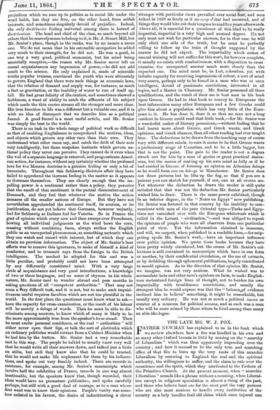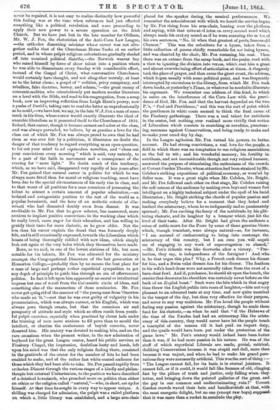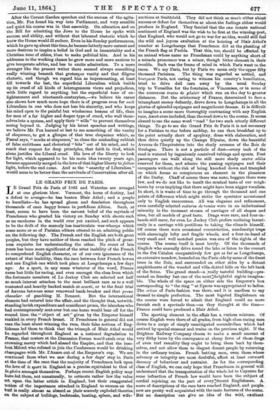THE LATE MR. W. J. FOX.
BATHER N EWMAN has explained to us in the book which r we review elsewhere how a fire was kindled in his own and so many other Oxford breasts in 1832 by musing on the "anarchy of Liberalism" which was then apparently impending over the country ; and how it seemed to be the only true and searching office of that fire to burn up the very roots of this anarchic Liberalism by restoring to England the zeal and the spiritual authority, the willingness to suffer, and the claim to rule over the conscience and the spirit, which they attributed to the Fathers of the Primitive Church. At the present moment, when "anarchic Liberalism" sounds like a phrase without a meaning, when Liberal- ism except in religious speculation is almost a thing of the past, and those who believe least are for the most part the vesy persons who are also most anxious to handle every institution of the country as a lady handles frail old china which once injured can never be repaired, it is not easy to realize distinctly how powerful this feeling was at the time when reformers had just effected something like a political revolution and were proceeding to apply their new power to a severe operation on the Irish Church. But we have just lost in the late member for Oldham, Mr. W. J. Fox, the rhetorician of the Anti-Corn Law League,- -the orthodox dissenting milliliter whose career was not alto- gether unlike that of the Churchman Horne Tooke at an earlier period, and in whose pulpit religious exhortations gradually shaded off into unmixed political diatribe,—the Norwich weaver boy who raised himself by force of sheer. talent into a position where. he WM able to disseminate every Sunday with considerable effect, instead of the Gospel of Christ, what converaative Churchmen -woald certainly have thought, and not altogether untruly, at least as to the latter clause, a gospel of "sedition, privy conspiracy, and rebellion, false doctrine, heresy, and schism,"—the great enemy of conventionalities, who ostentatiously put modern secular literature on a level with the Bible, and read to hie congregation, from a scrap book, now an improving reflection from Leigh Hunt's poetry, now a psalm of David's, taking care to read the latter ae unprofessionally as heeould,—we have lost, we say, in the late W. J. Fox a man of some mark in his time, whose career would exactly illustrate the ideal of anarchic liberalism as it presented itself to the Churchmen of 1832. Indeed, that career, though it became earnest and sober at the close, and was always pervaded, we believe, by as genuine a love for the class out of which Mr. Fox was always proud to own that be had -risen as was ever felt by a politician, it illustrates no doubt the danger of that tendency to regard everything as an open.question, to let out your mind to ad capiandum novelties, and "clean out yoar, convictions every morning" which is said, very untruly, to be a part of the faith in movement and a consequence of the craving for "more light." No doubt much of this tendency, which, as we have said, disappeared very rapidly of late years after Mr. Fox gained that natural career in politics for which he was always more fitted than for moral or religious teaching, must have been due to the special circumstances of -his.early rise in class, and to that. worst of all pesitions for a man conscious of possessing the talent to attract a certain amount of popular admiration,---an isolated and antagonistic position to the rest of the world as a populaeleresiarch, and the hero of an aasthetic coterie of . illu- minati who had dissented doubly even from dissent. It was creditable to Mr. Fox that he grew soberer, less mannered,, more anxious to implant positive convictions in the working class which he really loved, more eager for their education, and less willing to gratify their taste for .mere rhetoric, as he grew older. Not the less, does his career explain the dread that was formerly deeply felt, and is still occasionally expressed, towards the Liberalism which boasts of being thoroughly riddled with new ideas, which simply leak out again at the very holes which they themselves have made Born, aswe said, in one of the lowest stations of life, but soon notable for his talents, Mr. Fox was -educated for the ministry amongst. the Congregational Dissenters of the last generation at Homerton College,—probably then by no means the best place for a man of large and perhaps rather superficial sympathies to get any depth of principle to guide him-through an era of effervescent politics. In fact it left. upon him apparently no moral or intellectual impress but one of recoil from the Calvanistic circle of ideas, and something also of the mannerism of those seminaries. Mr. Fox never got quitarid of the manner of "the young man from 'Omerton, who made an 'it,"—not that he was ever guilty of vulgarity in hia pronunciation, which was always correct, or-his English, which was always pure though ornate, but that the conscious air and pomposity of attitude and style which so often result from youth- ful pulpit exercises, especially when practised by clever lads under the training of men more anxious to fill pews than to mould the intellect, or chastise the exuberance of boyish conceits, never deserted him. His oratory was devoted to making hits, and on the rare occasions when the present writer, in the raw admiration of boyhood for the great League orator, heard his public services at Finsbury Chapel, the impression, doubtless hasty and harsh, left tupon his mind was that the only religious feeling there, consisted in the gratitude of the orator for the number of hits he had been .enabled to make, and of the rather fast white-coated audience for those which they had been able to take. Mr.Fox passed rapidly from orthodox Dissent through the various stages of a kindly and philan- thropies but external Unitarianism, to the position we have described of &deistical heresiarch, who preached more on polities than either on ethics or the religion called "natural,"—who, in short, set uplor himself. At that time he sought in every way to appear unique. A shilling was -charged for admission, the pulpit was a railed platform on which a, little library was established, and a large armehair I placed for the speaker during the musieal performances We remember the-astonishment with which we heard the service begun by Mr. Fox rising from his arm-chair, leaning over the platform aud saying, with that reiterated ictus on every-second word which. always made his oratary sound as, if he were scanning the in t, eof his own sentences, "No. 55 when that greatest of poets, famous old Chaucer." This was .the substitute for a hymn, taken from a little collection of poems chiefly, remarkable for not being hymns, and was chanted by the choir, Mr. Fox resuming his seat.. Then there was an extract from the scrap-book, and the psalm. read with a view-to ignoring the division into verses, which cost him a great and almost overwhelming effort of articulation at tintes.,A, rhapsody took the place of prayer, and then came the great event, the address,. whieh began usually with some political point, and was freque.ntly interrupted by excursions to the library, from which Mr. Fox, took down books, or yesterday's.Times, or whatever he-neededto illustrate his argument We remember one address - of thiekiad, in which in satire on the interference of the Corn Law with the provi- dence of God, Mr. Fox, said that the harvest depended on the two P.'s, "Peel and Providence," and this was the sort of point which the gentlemen in white coats seemed to think the final cause of, the Finsbury gatherings. There was a real talent for antithesis in the orator, but. nothing ever realized mons. vividly that notion of Liberalism which consists in snatching at noveltim Punctuat- ing, sarcasms against Conservatives, and being ready to make and re-make your creed day by day, In the League agitation Mr. Fox turned his. powers to better account. .H e had strong convictions, a real love for the people, a field in which there was no temptation to use. religious associations as the foil to wit ; and his wonderful memory, his fertility in antithesis, and not inconsiderable though not very refined humour, answered the purpose of stimulating the enthusiasm of the crowds at Covent Garden Theatre, whose attentionbad been strained byMr. Cobden's striking expositions of political, economy, or wear' ed by duller men. It was a great night when Mr. Cobden, M r. Bright, and Mr. Fox.followed each other on that stage, Mr. Cobden raising the self-esteem of the audience by making ,even boys and women feel intelligent on a highly tee.huical subject under the spell of his lucid illustration ; Mr. Bright striking the chords of popular passion and ñiaking everybody believe for a moment that they hated and loathed the aristocracy, whom he so indignantly and so passionately spurned Mr. Fox exciting the fancy of the multitude by his glit- tering rhetoric, and its laughter by a humour which just hit the level of their taste. After Mr. Bright had given the audience a sense of noble scorn for the Peers by some of those genuine blows which, though truculent,. were always natural—as, for instance, "I am accused: of endeavourieg to bring into contempt the aristocracy of this country, bat I am sure you will- acquit me of engaging, in any work of supererogation so absurd," —Mr. Fox's ridicule was, like fireworks after a victory. "Pro- tection, they say, is independence of the foreigner ! And who is. he that urges this plea Why, a French cook dresses his dinner for him, and a Swiss valet dresses him for his dinner. The feathers in his wife's head-dress were net assuredly taken from the crest of a barn-door fowl. And if perchance, he should sit upon the bench, the ermine that decorates his shoulders was certainly never before on the back.of an English beast." Such were the hitewhieh in that angry tfeeimlein, tehreanwy tpassihe Eolinglagishaipnsubt litcheintoarisrotoaersraoofylatu:lutteghr,—hehimteadnoettvheemry pleasant to au .educated taste at any time, and now quite unsuited to the temper of the day, but then very effective for their purpose, and never in any way malicious. Mr. Fox loved the people without
food for his xhetotic,—as when he said that "if the Hebrews of the time of the Exodus had had an aristocracy like the aristo- cracy of this. country, they would never have let the people touch a teacupful of the manna till it had paid an import duty, and the quails would. have been, put under the protection of the game laws." Mr. Fox's oratory would indeed have been better than it was, if he had more passion in his nature. He was of the stuff of which superficial Liberals are. made, genial, satirical, disliking Conservatism because it was stupid and dull, more than because it was unjust, and when he had to make his grand pero- rations they were necessarily artificial. This was the sort of thing :— "The League cannot fall, for its basis is in eternal jointure. It cannot fall, or if it could, it would fall like Samson of old, clinging fast by the pillars of truth and justice, only falling when they totter, and bringing down the painted galleries of the great and the gay in one common and undiscriminating ruin l" Covent Garden crowds waved their hats and handkerchiefs at that, with the most energetic delight, but no one (except raw boys) supposed that it was more than a rocket to conclude the play.
After the Covent Garden speeches and the success of the agita- tion, Mr. Fox found his way into Parliament, and very sensible and quiet his course was in that assembly. On education and on the Bill for admitting the Jews to the House he spoke with success and ability, and without that laboured rhetoric which he knew the House would ill endure. Even in his Sunday performances, which he gave up about this time, he became latterly more earnest and more desirous to inspire a belief in God and in immortality and a Christian, tone of ethics, than to make political hits. And in his addresses to the working classes he grew more and more anxious to give temperate advice, and less to excite admiration. To a mere stranger like the present writer there seemed always something really winning beneath that grotesque vanity and that filigree rhetoric, and though we regard him as impersonating, at least till towards the last, the superficial Liberalism which builds up its creed of all kinds of heterogeneous views and prejudices, with little regard to anything but the superficial tone of en- lightenment and nineteenth-centuryism,—we believe his career also shows how much more hope there is of progress even for such Liberalism in one who does not lose his sincerity, and who keeps his mind open to the painful but wholesome lessons of life, than for men of a far higher and deeper type of creed, who wall them- selves into a system, and apply their " wills" to prevent themselves seeing beyond it. Judging by his latest speeches and writings, we believe Mr. Fox learned at last to see something of the vanity of eloquence, to get a glimpse of that true eloquence which, as Pascal says, "mocks at eloquence," to clean the misleading rubbish of false antitheses and rhetorical " hits " out of his mind, and to reach that respect for deep principles, that faith in God, which alone justifies the Liberal creed. His love of the liberty to look for light, which appeared to be his main idea twenty years ago, became apparently merged in the love of that higher liberty to follow light, before the end came. And so the "anarchy of Liberalism" would seem to be better than the servitude of Conservatism after all.






























 Previous page
Previous page